A Bronx tale, of Fordham University and environs:
[T]he one nostalgic oasis of civility in the neighborhood was the old Eldorado Bar on Third Avenue, right under the Third Avenue El. The El was scheduled for demolition by 1972. The bar, which had been a tavern since 1890, had a high, plank ceiling supported by a row of wooden posts, with the big rotating fans that later became fashionable in Manhattan watering holes. It had a pool table with a ripped felt cover, and it served Italian hero sandwiches and hamburgers thrown together in a dingy kitchen in the back. The proprietor was Nick DeMaio, five-foot-six and stocky, in his late seventies, wearing a tie and sometimes an apron. He muttered unintelligible wisdom in a gruff voice with a cigar butt stuck in the side of his mouth.
Nick had bought the place in 1922. Faking it as a flower shop in front, the place had been a speakeasy during Prohibition, but more than anything, with its long, solid mahogany bar and the mirror behind it, it resembled a saloon in the cowboy movies.
Raymond A. Schroth, Fordham: A History and Memoir (Chicago: Loyola Press, 2002), 326.
I’m happy to know something about the Eldorado, or the El D, as it was called, a bar I visited but once, with two friends, in the summer of 1981. The place was vast, like an empty stage, with a dull, smooth wood floor. The only people were my friends and I, some tough customers at the pool table, and the proprietor, a little old man wearing a white shirt, a black tie, a brown cigar, and a barkeeper’s apron. The guy was a throwback, as my daughter Rachel would say. He must have been Nick DeMaio.
The Social Security Death Index lists one Nicholas DeMaio whose dates (1898–1993) and last residence (in the Bronx, just a short ride from the bar) mark him as the proprietor of the El D. I’m amazed to think that I was
likely ordering beers from a man who had been serving them during Prohibition. I now know from the photograph below that the man tending bar was Nick DeMaio.
*
May 20, 2020: A Fordham alum left a link to
a 1981 Ram article about Nick DeMaio and the El D. Thanks!
*
May 21: Another alum found
a 1978 Ram article with a photo of Nick DeMaio. Thanks!
*
May 22: Here are photographs of the Eldorado and Nick DeMaio, from
The Ram, April 20, 1978. The photographer’s name is Joe Spinosa. And now I can say with certainty that that was Nick DeMaio behind the bar.
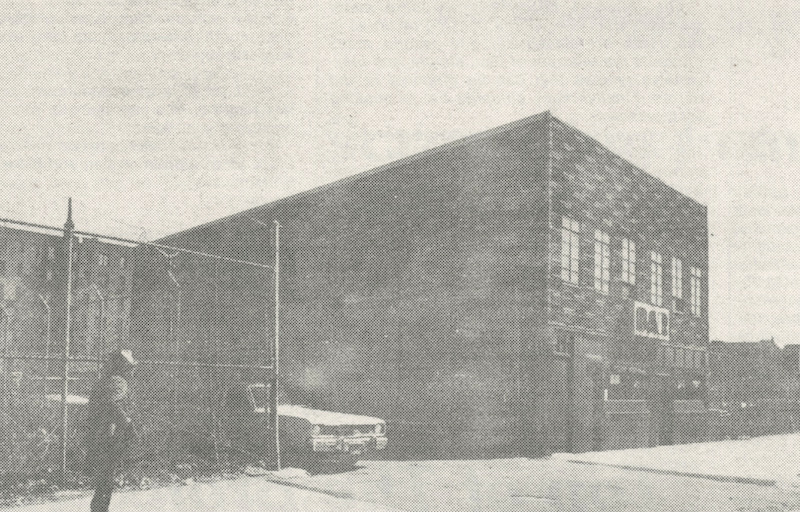
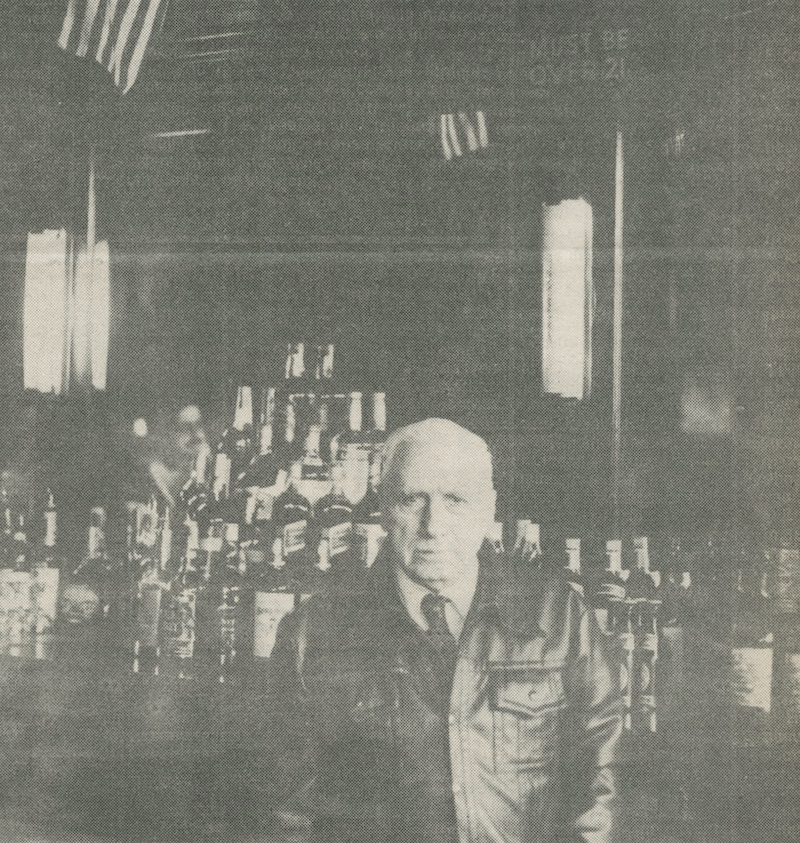
[Click either image for a larger view.]
And one more from
The Ram, September 24, 1981. The photographer’s name is Dean Donahue.

[Click for a larger view.]
These scans of newspaper pages replace less distinct images from the online
Ram. Many thanks to Jeannie Hoag, Reference & Assessment Librarian, and Vivian Shen, Archives Librarian, both of Fordham University.
*
January 29, 2022: And here is a photograph of the El D BAR sign, salvaged by students after the building was razed.
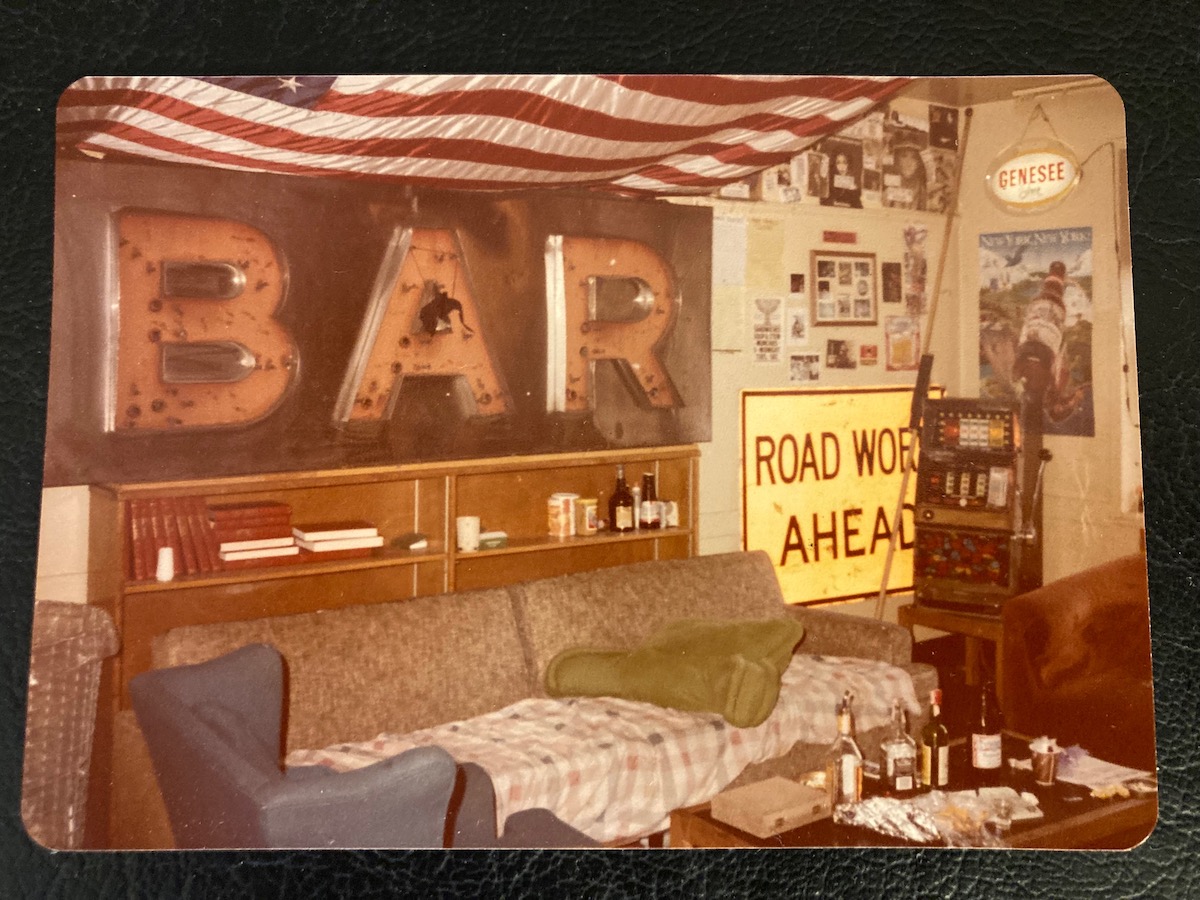
[Click for a larger view.]
*
January 31: Three more photographs, with the El D making cameo appearances, to the right of the Third Avenue El, or what then remained of the El. Look for the building with the slanting roof and the two-tone wall:
1,
2,
3.
*
And
one more.
*
February 1: And now, at long last, the Eldorado is ready for its close-up:
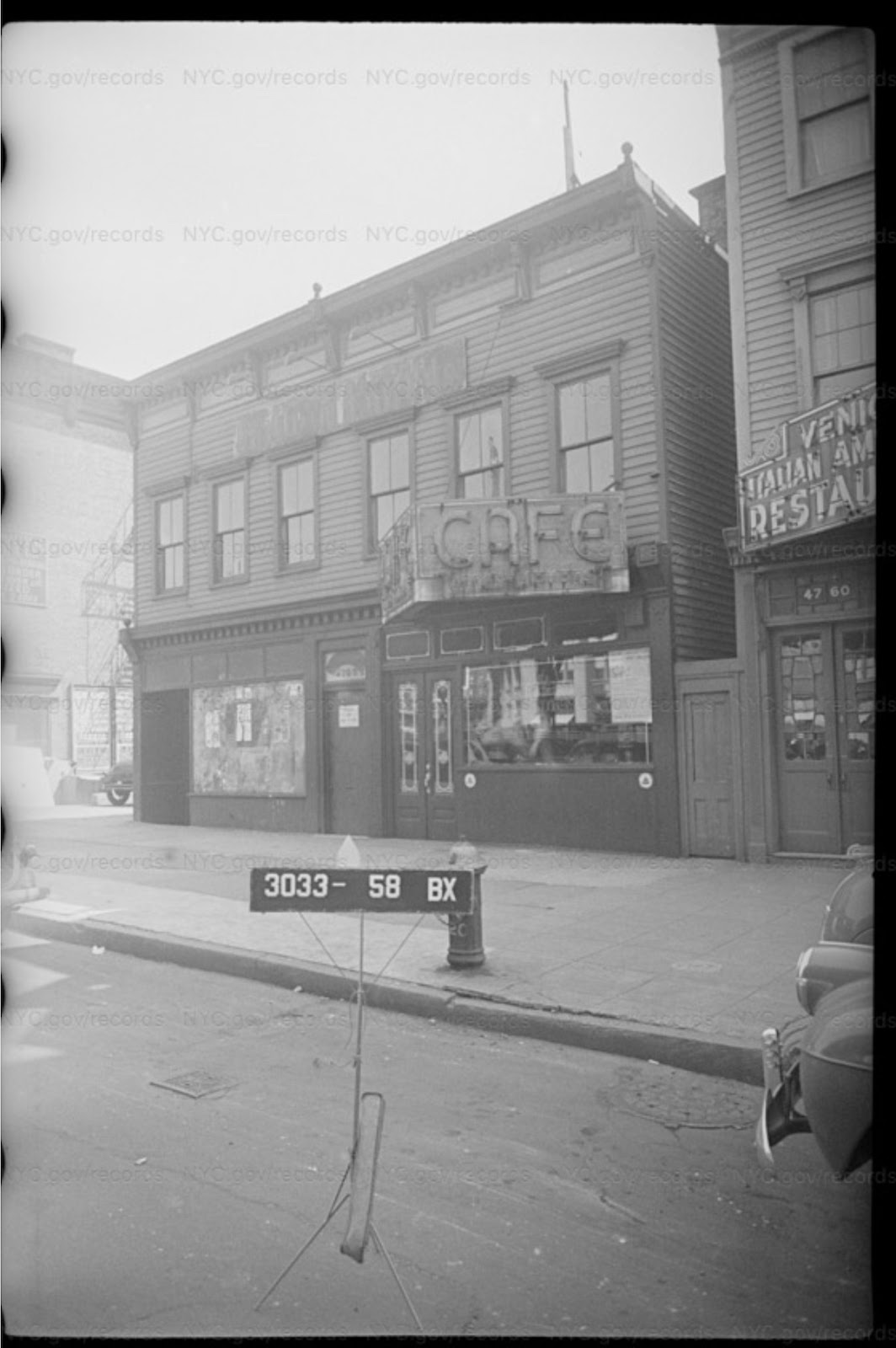
[4762 Third Avenue, Bronx, New York, c. 1939–1941. From the
NYC Municipal Archives Collections. Click for a much larger view.]
I tried tracking down a tax photograph by checking
the 1940 telephone directory, which had no listing for the Eldorado. Without a street address, the bar cannot be found via
Street View of 1940s New York, as its address no longer exists (what was 4762 is now part of the massive Fordham Plaza). But if you have a street address to type in, you’ll find the Eldorado in Street View or in the Municipal Archives (albeit as 4764).
Credit for finding the 4762 address (in a 1974 telephone directory) and the tax photograph goes to Steven Payne, librarian and archivist at
The Bronx County Historical Society.
*
February 7: But wait — there’s more. Here’s the Eldorado in
film footage of the Bronx portion of the Third Avenue El. There’s some Fordham scenery beginning at 1:50. Pick up again at 10:20 and you’ll see the two-tone wall of the El D at 10:36.
*
November 21: Here’s the “Must Be Over 21” sign. Jim S. (FC ’85) and Joe M. (CBA, now Gabelli, ’86) bought it from and had it signed by Nick DeMaio. Jim looked for and found it in his attic:

[This sign is visible at the very top of the photograph of Nick DeMaio above. Click for a larger view.]

[One corner of the back, signed, “Eldorado Cafe Inc. N.D.”]
And here’s a 1983 article, also signed, published as the Eldorado neared the end of its life. Christopher Keating also wrote the 1981
Ram article above.
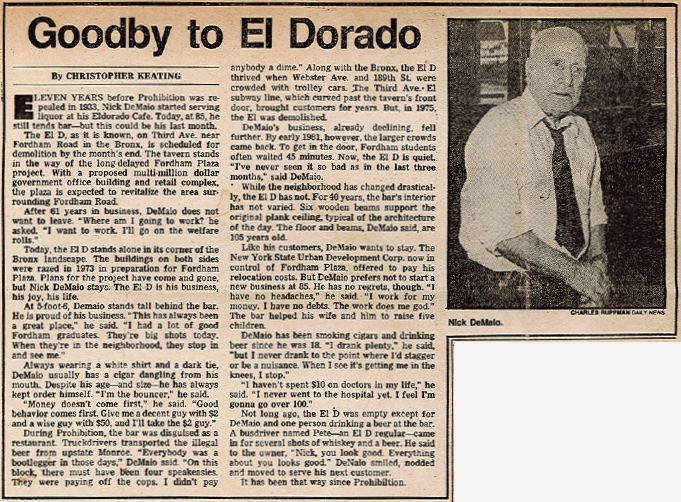
[
Daily News, July 21, 1983. Click for a larger view.]

[A newspaper margin, signed “Eldorado Cafe Inc. N.D.”]
Thanks to Jim and Joe for bringing more of the Eldorado back into view.
*
December 1: A wonderful addition to this post: photographs from a wedding party’s visit to the Eldorado. Claire and Howie (both Fordham College ’80) visited the Eldorado after their wedding on April 9, 1983. The 3rd Avenue El had ceased operating on
April 28, 1973. According to the
Daily News article above, the Eldorado was to be demolished in July 1983. It was demolished later that year. I am glad that Claire and Howie got to it in time. Click on any image for a larger view.



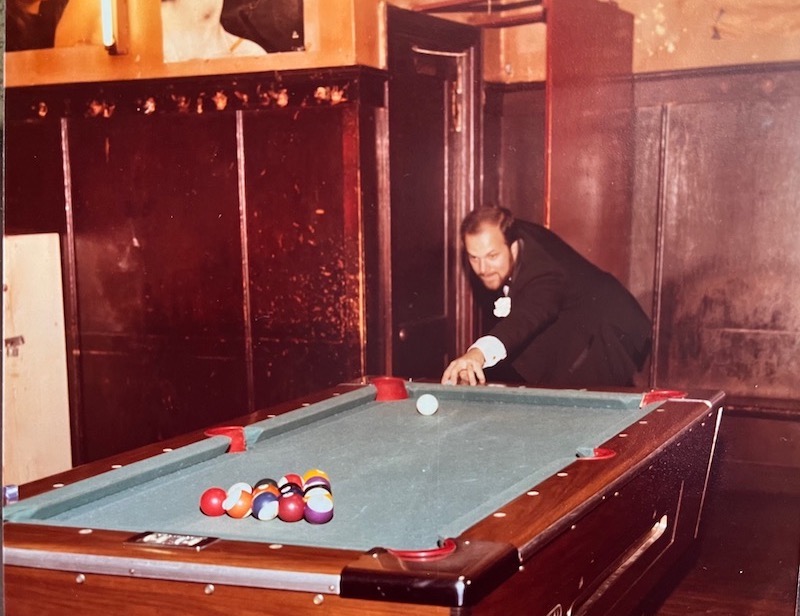



[Here’s
a Fordham Road sign in its native habitat — an El platform.]

[Nick Demaio, of course, with the just-married couple.]
*
Exiled in boston left a comment on
another post that has attracted El D patrons:
I am disappointed that I see no reference to Max who tended bar there in the late 60s. The bar also had a great jukebox then. It had a great selection including Hank Williams. As far as I could ever tell, the only place that actually identified the bar as the El Dorado was on the jukebox.
That reader was generous enough to share a photograph of the El D from around the time when the Third Avenue El was being demolished. Wikipedia dates the demolition of the line to
1977.

*
Just one more: A reader found this advertisement in
the Fordham Libraries Digital Collections. From the program for a football game, Fordham vs. Widener University, September 27, 1974:

Thanks again to all who have contributed to the online afterlife of the Eldorado.
More Bronx tales
Elvis pretzels :
The Bronx and Fordham in Naked City



































